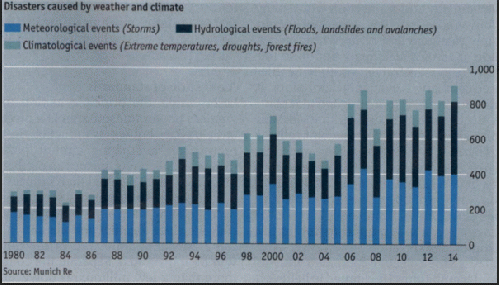v>
Global warming deniers have used the strategy of raising doubt about the facts, following the very successful reliance on such strategy by the tobacco companies. Those who saw the danger have engaged the critics in an ongoing contest of competing claims. This has it entirely backwards. It is not what is known that should frighten us. Rather, it is what is not known.
One of our government experts on climate change was recently asked to give his personal assessment. He said that he waxed hot and cold on the matter, sometimes thinking we will be ok, and at other times thinking that we may have already crossed the threshold of catastrophe. He who is among the best informed is confronted with the unknowable. The things we most need to know we do not know and cannot yet know. Neither the data nor the scientific models are in place. The skeptic can always take refuge in such ambiguity, but that is a false harbor.
The situation is actually analogous to what we confront in our defense policy. It would be absurd to say that a threat needs to be specified to a certainty before we bother to prepare for it. It is what we don't know and cannot know that drives the defense budget. We have to prepare for eventualities, based on the precautionary principle. This is driven by the fact that military procurement involves long lead-times, and military preparedness requires forces to be in place at all times.
We face qualitatively the same issues in global warming. We are most concerned about approaching critical thresholds: the threshold at which the melting of Antarctic ice becomes significant, and the threshold at which frozen methane on the ocean floor starts bubbling to the surface massively. If we wait until we are certain that these thresholds are being crossed because of ocean temperature rise, it will take just as much time to cool the ocean as it took to warm up in the first place. So we need lead times to address potential problems before they become acute. We cannot wait until we have absolute certainty.
Is this not an argument that even global warming skeptics can understand? We have to act now because the alternative could be catastrophic. It is uncertainty that compels us to act now in our own long-term interest. In that sense, we do know all that we need to know in order to force our hand.
By accepting the challenge of the skeptics, the scientific community has been busy seeking and consolidating a consensus position. This guarantees that the outcome will be a kind of middle-of-the-road position, a linear projection in a nonlinear reality. Necessarily it will avoid the real issues, namely just how close we are to the various tipping points, because these will inevitably be controversial. As soon as the focus is on a consensus position, the debate is already lost because the real issues will have been side-lined.
Republicans are mobilizing their base with fear. Why can't that be done with global warming? Let's put the real issues on the table, the ones that are really scaring us. Threatening people with a two-degree temperature rise does not cause anybody to lose sleep. The nonlinearities are the problem. Most of those are far off, which cannot scare people either, but some nonlinearities are already starting to show up---in weather patterns. As predicted, temperature rise brings with it increased variability of the weather. Since 1980 the world has seen a doubling of meteorological events (large storms); it has seen a tripling of hydrological events (major floods, landslides and avalanches); and it has seen a quadrupling of climatological events (extreme temperatures, droughts, and major forest fires). We're increasingly seeing catastrophic events for which there is no precedent in recorded history.
For years, severe weather events have caused newsmen to ask whether they were harbingers of global warming. As if the issue were ever in doubt! We are living in an age of global warming such that all weather is influenced by it. This is today's reality, and it is already scary in its implications. After all, these nonlinear trends will just continue until we turn things around--in the atmosphere, and in the ocean. There is no sign of that happening, and that is truly scary.
(The source of these data is Munich Re, a reinsurance company. Such companies are at greatest financial risk by virtue of weather disasters. They can be counted on to keep track of these issues.)
|
Rate It | View Ratings |
Siegfried Othmer is a physicist who over the last 33 years has been engaged with neurofeedback as a technique for the rehabilitation and enhancement of brain function. He is Chief Scientist at the EEG Institute in Los Angeles. Coming to (more...)
The views expressed herein are the sole responsibility of the author
and do not necessarily reflect those of this website or its editors.

OpEdNews depends upon can't survive without your help.
If you value this article and the work of OpEdNews, please either Donate or Purchase a premium membership.
STAY IN THE KNOW
If you've enjoyed this, sign up for our daily or weekly newsletter to get lots of great progressive content.
If you've enjoyed this, sign up for our daily or weekly newsletter to get lots of great progressive content.
To View Comments or Join the Conversation:






